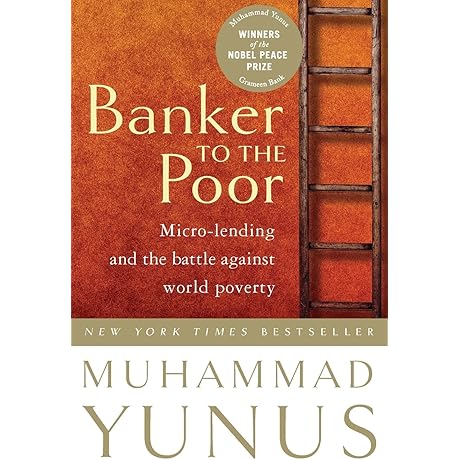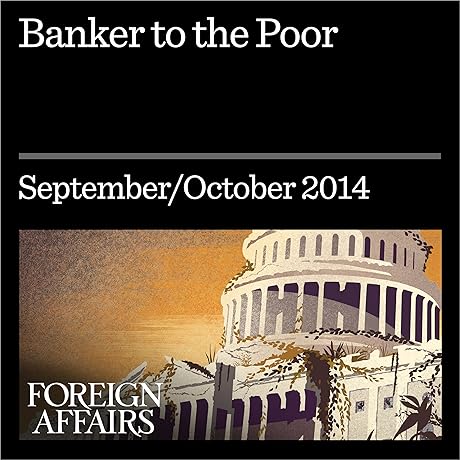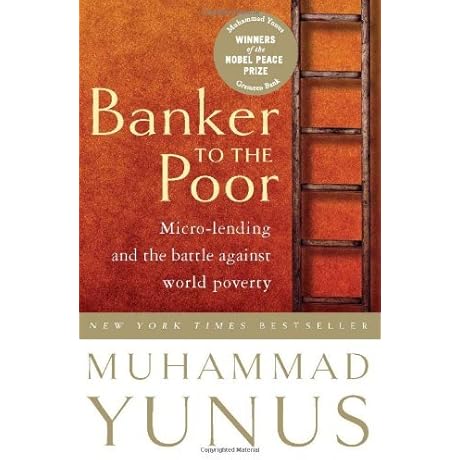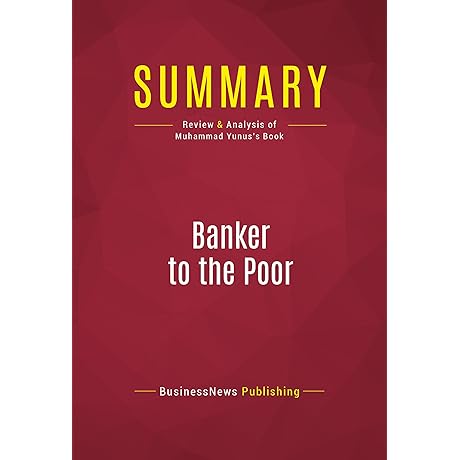· micro lending · 12 min read
The Best Banker to the Poor Reviewed
An optimal overview detailing the top banker to the poor options available today.
Micro-lending and the battle against world poverty are the main themes of "Banker to the Poor." Muhammad Yunus, the book's author, has devoted his life to assisting the impoverished. This book provides an insightful perspective on micro-lending and its potential to alleviate poverty. If you're interested in learning more about micro-lending or Muhammad Yunus, this book is a must-read.
Overview

PROS
- Empowering individuals with access to micro-loans, a lifeline for the financially vulnerable.
- Showcasing the transformational power of micro-lending in alleviating poverty sustainably.
CONS
- Limited generalizability, as micro-lending may not be universally applicable to all impoverished communities.
- Potential for exploitation if micro-loans are not managed responsibly and transparently.
- Does not address the root causes of poverty, which require a broader societal approach.
In 'Banker to the Poor,' Muhammad Yunus, the Nobel Peace Prize laureate and pioneer of micro-lending, shares his insights into the transformative power of microfinance in combating global poverty. Yunus's compelling narrative sheds light on the struggles of the underprivileged and the remarkable impact of small loans in empowering them.
Through gripping anecdotes and incisive analysis, Yunus demonstrates how micro-lending can provide a lifeline to those excluded from traditional banking systems. By extending credit to the poor, micro-lending fosters economic independence, encourages entrepreneurship, and ultimately alleviates poverty. Yunus emphasizes the importance of empowering women through micro-loans, recognizing their crucial role in improving family well-being and driving social progress.

PROS
- Unveils the transformational impact of micro-lending on poverty alleviation
- Shares real-life stories of individuals empowered by micro-finance
CONS
- May require prior understanding of microeconomics and development concepts
Step into the world of 'Banker to the Poor,' a captivating exploration of micro-lending's remarkable power in combating global poverty. Muhammad Yunus, the visionary behind the Grameen Bank, takes us on a journey to understand how small loans can unlock a world of possibilities for the underprivileged.
Through a blend of personal anecdotes and rigorous analysis, Yunus paints a vivid picture of how micro-lending empowers individuals and transforms communities. He showcases how access to capital enables the poor to invest in small businesses, educate their children, and improve their living conditions. Yunus's passion and unwavering belief in the potential of the poor shine through on every page.

PROS
- Offers insights into the challenges and opportunities facing the international development community.
- Provides a unique perspective on the role of the World Bank in addressing poverty and inequality.
CONS
- Can be overly technical at times and may not be accessible to general readers.
- At times, it reads more like a transcript than a narrative.
In "Banker to the Poor", we get an inside look at the life and work of Jim Yong Kim, President of the World Bank. Kim is a renowned physician and anthropologist who has dedicated his career to fighting poverty and improving global health. The book is a collection of conversations between Kim and journalist Tom Brokaw, and it covers a wide range of topics, from Kim's childhood in South Korea to his work at the World Bank. Throughout the book, Kim emphasizes the importance of empathy and compassion in the fight against poverty and he argues that economic development must be inclusive and sustainable in order to be truly effective.
"Banker to the Poor" is a fascinating and inspiring read for anyone interested in international development or global health. Kim is a thoughtful and articulate leader, and his insights into the challenges and opportunities facing the world today are invaluable. The book is also a reminder of the importance of empathy and compassion in making a difference in the world.

PROS
- Provides an insightful examination of the theory and practice of micro-lending.
- Written by Muhammad Yunus, the Nobel Peace Prize laureate who pioneered the concept of micro-lending.
CONS
- May be too academic for some readers.
- Some sections may be outdated due to the continuously evolving nature of micro-lending.
This book presents a comprehensive exploration of the origins, principles, and impact of micro-lending, delving into the transformative potential of providing financial services to the world's poorest populations. Muhammad Yunus, the visionary Bangladeshi economist and Nobel Peace Prize laureate, eloquently articulates the human-centric approach of micro-lending, emphasizing the dignity and empowerment it brings to individuals who have been denied access to traditional banking.
Yunus's writing is both intellectually stimulating and deeply personal, as he recounts his own experiences in establishing the Grameen Bank. The book offers invaluable insights into the challenges and successes of micro-lending, providing a roadmap for other organizations and individuals seeking to alleviate poverty through financial inclusion.

PROS
- Provides a comprehensive overview of Muhammad Yunus' life and work, highlighting his contributions to microfinance and social entrepreneurship.
- Examines the impact of Yunus' Grameen Bank on poverty reduction and women's empowerment.
CONS
- May be too detailed for readers seeking a general introduction to microfinance.
- Lacks specific examples of how Yunus' ideas have been implemented in various cultural contexts.
Banker to the Poor delves into the inspiring life and groundbreaking work of Muhammad Yunus, the Nobel Peace Prize laureate who revolutionized the field of microfinance. Author Kalyani Mookherji offers a detailed account of Yunus' humble beginnings, his pioneering concept of microcredit, and the establishment of Grameen Bank. The book traces the evolution of Yunus' ideas, from their inception to their widespread impact on poverty reduction and women's empowerment.
Through a blend of personal anecdotes, historical context, and expert insights, Banker to the Poor showcases Yunus' unwavering dedication to empowering the poor and marginalized. Mookherji deftly analyzes the challenges and criticisms faced by Grameen Bank, while also highlighting the organization's remarkable success in providing financial services to millions who were previously excluded from traditional banking systems.

PROS
- Offers comprehensive insights into Muhammad Yunus's philosophy and approach to poverty alleviation
- Provides practical lesson plans and case studies for educators and students
- Explores the transformative power of microfinance in empowering marginalized communities
CONS
- May require some background knowledge in finance or development economics
- Some sections could benefit from more in-depth analysis and examples
The 'Lesson Plans Banker to the Poor' serves as an invaluable resource for educators, students, and individuals seeking to delve into the world of microfinance and social entrepreneurship. Carefully designed lesson plans, enriched with real-world case studies, guide readers through the principles and practices that have shaped Muhammad Yunus's renowned approach to poverty alleviation.
This comprehensive guide illuminates the empowering nature of microfinance, highlighting its ability to transform the lives of marginalized communities. Through a blend of theory and practical exercises, readers gain a deep understanding of Yunus's philosophy, exploring the concepts of social business, financial inclusion, and the Grameen Bank's innovative model. While a basic understanding of finance or development economics can enhance the learning experience, the lessons are crafted to be accessible to all.

PROS
- Provides a comprehensive overview of Muhammad Yunus's microfinance model.
- Explores the potential of microfinance to alleviate poverty and drive economic growth.
CONS
- May be too technical for readers with limited economic background.
- Does not delve deeply into the challenges and limitations of microfinance.
Muhammad Yunus, renowned as the 'banker to the poor,' revolutionized the field of economics with his pioneering microfinance model. In 'Banker to the Poor,' Yunus unveils his groundbreaking approach to poverty alleviation, emphasizing the empowerment of the poor through access to financial services. This book offers a comprehensive analysis of Yunus's economic theories, exploring the transformative potential of microfinance in driving economic growth and social development.
Yunus's unwavering belief in the potential of the poor to lift themselves out of poverty forms the cornerstone of his economic philosophy. He argues that traditional banking systems often exclude the poor, creating a barrier to their economic progress. Microfinance, as Yunus envisions it, provides small loans and financial services tailored to the needs of the poor, enabling them to start businesses, invest in education, and improve their livelihoods. The book delves into the practical implementation of microfinance, showcasing its success stories and highlighting its impact in various developing countries.

PROS
- Offers a comprehensive overview of the life and work of Nobel Peace Laureate Muhammad Yunus.
- Provides a profound understanding of the concept of microfinance and its transformative potential.
CONS
- Lacks in-depth analysis of the challenges faced by Grameen Bank in recent years.
- Style might be a bit dry for those seeking a more engaging read.
Muhammad Yunus' autobiography, entitled Banker to the Poor, serves as a detailed account of his life's work and the founding of Grameen Bank. This illuminating read provides remarkable insights into the motivations behind his extraordinary contributions to the field of microfinance, while highlighting the transformative power of providing financial services to the underprivileged. Yunus' personal experiences and reflections throughout the narrative offer a unique perspective, making this an enlightening read for those interested in understanding the impact and significance of microfinance.
The book delves into the challenges and complexities involved in establishing Grameen Bank and the groundbreaking concept of microcredit. Yunus' unwavering commitment to empowering the poor by providing access to financial services shines through, inspiring readers to reflect on the potential of inclusive banking as a tool for economic and social transformation. This autobiography is a valuable resource for students, practitioners, and anyone passionate about the fight against poverty and the promotion of financial inclusion worldwide.
Muhammad Yunus, the author of "Banker to the Poor," emphasizes the value of micro-lending in the fight against global poverty. Yunus thinks that by giving the poor access to small loans, they can launch enterprises and enhance their quality of life. The book provides instances of how micro-lending has been successful in various nations and discusses the difficulties of putting such programs into practice. Overall, "Banker to the Poor" is a well-written and educational book that sheds light on the issue of global poverty.
Frequently Asked Questions
Who is Muhammad Yunus?
Muhammad Yunus is a Bangladeshi social entrepreneur, banker, and economist who is widely recognized for his pioneering work in the field of microfinance. He is the founder of Grameen Bank, which provides micro-loans to the poor, especially women, in Bangladesh. Yunus and Grameen Bank were jointly awarded the Nobel Peace Prize in 2006 for their efforts to promote economic and social development through micro-lending. His institution's microcredit programs are targeted towards providing banking services to the impoverished without requiring collateral. This practice runs counter to the standard banking methodology and is deemed groundbreaking.
What is micro-lending?
Micro-lending is the practice of providing small loans to impoverished individuals who lack access to traditional banking services. Micro-loans are typically used to finance small businesses or income-generating activities. Micro-lending institutions often target women and other marginalized groups who have difficulty obtaining loans from traditional banks.
How does micro-lending help alleviate poverty?
Micro-lending can help alleviate poverty by providing the poor with access to capital. This capital can be used to start businesses, purchase assets, or finance education. Micro-lending can also help the poor build credit and savings, which can make them more resilient to financial shocks.
What are the challenges of implementing micro-lending programs?
One of the challenges of implementing micro-lending programs is reaching the poorest and most marginalized people. These individuals are often difficult to identify and may not have the necessary documentation to qualify for loans. Another challenge is ensuring that micro-loans are used productively and not for consumption purposes. Finally, micro-lending programs can be expensive to operate, and they may not be sustainable in the long term.
What is the role of Banker to the Poor in the fight against poverty?
Muhammad Yunus' book "Banker to the Poor" is an important contribution to the fight against poverty. The book provides a detailed overview of the micro-lending movement and its potential to alleviate poverty. Yunus argues that micro-lending is a powerful tool that can help the poor to lift themselves out of poverty and create a better future for themselves and their families.











